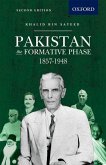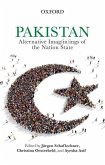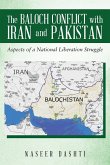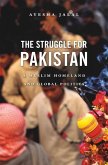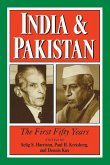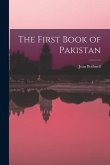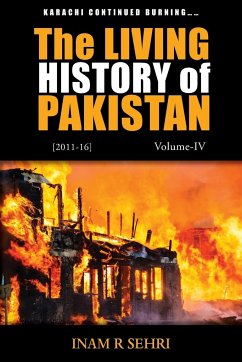M R Kazimi
Pakistan Studies
18,99 €
inkl. MwSt.
Versandfertig in über 4 Wochen

9 °P sammeln
M R Kazimi
Pakistan Studies
- Broschiertes Buch
- Merkliste
- Auf die Merkliste
- Bewerten Bewerten
- Teilen
- Produkt teilen
- Produkterinnerung
- Produkterinnerung
Pakistan Studies is written for students enrolled in the Four-Year BS Degree programme, the Five-Year BE and LLB Degree programme, and the Two-Year Associate Degree (AD) programme. The second edition of this essential textbook covers the National Curriculum for Pakistan Studies (compulsory) course.
Andere Kunden interessierten sich auch für
![Pakistan Pakistan]() Khalid B SayeedPakistan20,99 €
Khalid B SayeedPakistan20,99 €![Pakistan Pakistan]() Pakistan23,99 €
Pakistan23,99 €![The Baloch Conflict with Iran and Pakistan The Baloch Conflict with Iran and Pakistan]() Naseer DashtiThe Baloch Conflict with Iran and Pakistan11,99 €
Naseer DashtiThe Baloch Conflict with Iran and Pakistan11,99 €![The Struggle for Pakistan The Struggle for Pakistan]() Ayesha JalalThe Struggle for Pakistan26,99 €
Ayesha JalalThe Struggle for Pakistan26,99 €![India and Pakistan India and Pakistan]() Selig Harrison / H. Kreisberg / Dennis Kux (eds.)India and Pakistan22,99 €
Selig Harrison / H. Kreisberg / Dennis Kux (eds.)India and Pakistan22,99 €![The First Book of Pakistan The First Book of Pakistan]() Jean BothwellThe First Book of Pakistan17,99 €
Jean BothwellThe First Book of Pakistan17,99 €![The Living History of Pakistan (2011-2016) The Living History of Pakistan (2011-2016)]() Inam R SehriThe Living History of Pakistan (2011-2016)22,99 €
Inam R SehriThe Living History of Pakistan (2011-2016)22,99 €-
-
-
Pakistan Studies is written for students enrolled in the Four-Year BS Degree programme, the Five-Year BE and LLB Degree programme, and the Two-Year Associate Degree (AD) programme. The second edition of this essential textbook covers the National Curriculum for Pakistan Studies (compulsory) course.
Hinweis: Dieser Artikel kann nur an eine deutsche Lieferadresse ausgeliefert werden.
Hinweis: Dieser Artikel kann nur an eine deutsche Lieferadresse ausgeliefert werden.
Produktdetails
- Produktdetails
- Verlag: Oxford University Press
- 2nd edition
- Seitenzahl: 338
- Erscheinungstermin: 18. Juli 2024
- Englisch
- Abmessung: 231mm x 188mm x 23mm
- Gewicht: 476g
- ISBN-13: 9789697342938
- ISBN-10: 9697342938
- Artikelnr.: 69828357
- Herstellerkennzeichnung
- Libri GmbH
- Europaallee 1
- 36244 Bad Hersfeld
- gpsr@libri.de
- Verlag: Oxford University Press
- 2nd edition
- Seitenzahl: 338
- Erscheinungstermin: 18. Juli 2024
- Englisch
- Abmessung: 231mm x 188mm x 23mm
- Gewicht: 476g
- ISBN-13: 9789697342938
- ISBN-10: 9697342938
- Artikelnr.: 69828357
- Herstellerkennzeichnung
- Libri GmbH
- Europaallee 1
- 36244 Bad Hersfeld
- gpsr@libri.de
M. R. Kazimi has an MA and PhD from the University of Karachi. He has taught Pakistan Studies for more than thirty years in various colleges, and at the University of Karachi, the Aga Khan University, and M.A. Jinnah University. He is the author of Liaquat Ali Khan: His Life and Work (OUP, 2003), and has edited the Jinnah-Liaquat Correspondence (2003), and M.A. Jinnah: Views and Reviews (OUP, 2005).
* Foreword
* Preface to Second Edition
* Preface to First Edition
* Introduction
*
* SECTION A
* A Historical Perspective of Pakistan
* Part I Introduction: Land and People
* Profile of Early South Asian History
* Chapter 1: Muslim Society in South Asia
* Chapter 2: A Comparison of Muslim and Hindu Society
* Chapter 3: The Role of the Ulema and the Sufis
* Chapter 4: The Fall of the Muslims and the Establishment of British
Rule
* Part II The Renaissance of Muslim Society and the Reform Movements
* Chapter 5: Shah Waliullah (1703-1762)
* Chapter 6: The Jihad Movement
* Chapter 7: Titu Mir (1782-1832)
* Chapter 8: The Faraidi Movement
* Chapter 9: The War of Independence - 1857
* Chapter 10: The Educational Movements
* Part III The Resurgence of Muslim Political Forces
* Chapter 11: The Political Aspects of the Aligarh Movement
* Chapter 12: The Formation of the All-India Muslim League - 1906
* Chapter 13: The Lucknow Pact 1916
* Chapter 14: The Khilafat Movement 1918-1924
* Chapter 15: From Delhi Muslim Proposals to Quaid-i-Azam's Fourteen
Points: 1927-1929
* Chapter 16: Allama Iqbal's Allahabad Address 1930: Iqbal and the
Ideology of Pakistan
* Chapter 17: The Round Table Conference: 1930-1932
* Chapter 18: The Government of India Act 1935
* Chapter 19: The 1937 Elections and Congress Rule
* Part IV The Muslim Struggle for Pakistan and the British Response
* Chapter 20: The Lahore Resolution 1940 to the 1945 Elections
* Chapter 21: The Cabinet Mission Plan 1946
* Chapter 22: The Partition Plan-3 June 1947
* Chapter 23: The Radcliffe Award
* Chapter 24: The Role of the Majority Provinces
* SECTION B
* The Islamic Republic of Pakistan
* Part V Introduction: Ideology of Pakistan
* Chapter 25: The Establishment of Pakistan: Early Problems
* Chapter 26: Experiment in Democracy 1951-1958
* Chapter 27: The Ayub Khan Era 1958-1969
* Chapter 28: The Yahya Khan Regime 1969-1971
* Chapter 29: The Zulfikar Ali Bhutto Government 1971-1977
* Chapter 30: The Ziaul Haq Regime 1977-1988
* Chapter 31: Benazir Bhutto and Nawaz Sharif Governments 1988-1999
* Chapter 32: The Pervez Musharraf Regime 1999
* Chapter 33: The Fourth PPP Government 2008-2013
* Part VI The Constitution
* Chapter 34: Constitutional Developments-1947, 1956, 1962, and 1973
* Chapter 35: The Islamic Provisions of Successive Constitutions
* Part VII The Institutions
* Chapter 36: The Civil Service
* Chapter 37: The Armed Forces
* Part VIII Pakistans Foreign Policy
* Chapter 38: Introduction: Aims and Objectives
* Chapter 39: Pakistan and the World Powers
* Chapter 40: Pakistan's Relations with the SAARC States
* Chapter 41: Pakistan, the Non-Aligned Movement, and the Muslim World
* Part IX The Economy
* Chapter 42: Economic Development
* Chapter 43: Economic Planning
* Chapter 44: Energy Resources
* Chapter 45: The Environment of Pakistan
* Part X Pakistan's Cultural Heritage and Society
* Chapter 46: Culture and Society
* Chapter 47: Language and Literature
* Chapter 48: Human Resource Development and Education
* Chapter 49: Human Rights in Pakistan
*
* Glossary
* Bibliography
* Acknowledgements
* Index
* Preface to Second Edition
* Preface to First Edition
* Introduction
*
* SECTION A
* A Historical Perspective of Pakistan
* Part I Introduction: Land and People
* Profile of Early South Asian History
* Chapter 1: Muslim Society in South Asia
* Chapter 2: A Comparison of Muslim and Hindu Society
* Chapter 3: The Role of the Ulema and the Sufis
* Chapter 4: The Fall of the Muslims and the Establishment of British
Rule
* Part II The Renaissance of Muslim Society and the Reform Movements
* Chapter 5: Shah Waliullah (1703-1762)
* Chapter 6: The Jihad Movement
* Chapter 7: Titu Mir (1782-1832)
* Chapter 8: The Faraidi Movement
* Chapter 9: The War of Independence - 1857
* Chapter 10: The Educational Movements
* Part III The Resurgence of Muslim Political Forces
* Chapter 11: The Political Aspects of the Aligarh Movement
* Chapter 12: The Formation of the All-India Muslim League - 1906
* Chapter 13: The Lucknow Pact 1916
* Chapter 14: The Khilafat Movement 1918-1924
* Chapter 15: From Delhi Muslim Proposals to Quaid-i-Azam's Fourteen
Points: 1927-1929
* Chapter 16: Allama Iqbal's Allahabad Address 1930: Iqbal and the
Ideology of Pakistan
* Chapter 17: The Round Table Conference: 1930-1932
* Chapter 18: The Government of India Act 1935
* Chapter 19: The 1937 Elections and Congress Rule
* Part IV The Muslim Struggle for Pakistan and the British Response
* Chapter 20: The Lahore Resolution 1940 to the 1945 Elections
* Chapter 21: The Cabinet Mission Plan 1946
* Chapter 22: The Partition Plan-3 June 1947
* Chapter 23: The Radcliffe Award
* Chapter 24: The Role of the Majority Provinces
* SECTION B
* The Islamic Republic of Pakistan
* Part V Introduction: Ideology of Pakistan
* Chapter 25: The Establishment of Pakistan: Early Problems
* Chapter 26: Experiment in Democracy 1951-1958
* Chapter 27: The Ayub Khan Era 1958-1969
* Chapter 28: The Yahya Khan Regime 1969-1971
* Chapter 29: The Zulfikar Ali Bhutto Government 1971-1977
* Chapter 30: The Ziaul Haq Regime 1977-1988
* Chapter 31: Benazir Bhutto and Nawaz Sharif Governments 1988-1999
* Chapter 32: The Pervez Musharraf Regime 1999
* Chapter 33: The Fourth PPP Government 2008-2013
* Part VI The Constitution
* Chapter 34: Constitutional Developments-1947, 1956, 1962, and 1973
* Chapter 35: The Islamic Provisions of Successive Constitutions
* Part VII The Institutions
* Chapter 36: The Civil Service
* Chapter 37: The Armed Forces
* Part VIII Pakistans Foreign Policy
* Chapter 38: Introduction: Aims and Objectives
* Chapter 39: Pakistan and the World Powers
* Chapter 40: Pakistan's Relations with the SAARC States
* Chapter 41: Pakistan, the Non-Aligned Movement, and the Muslim World
* Part IX The Economy
* Chapter 42: Economic Development
* Chapter 43: Economic Planning
* Chapter 44: Energy Resources
* Chapter 45: The Environment of Pakistan
* Part X Pakistan's Cultural Heritage and Society
* Chapter 46: Culture and Society
* Chapter 47: Language and Literature
* Chapter 48: Human Resource Development and Education
* Chapter 49: Human Rights in Pakistan
*
* Glossary
* Bibliography
* Acknowledgements
* Index
* Foreword
* Preface to Second Edition
* Preface to First Edition
* Introduction
*
* SECTION A
* A Historical Perspective of Pakistan
* Part I Introduction: Land and People
* Profile of Early South Asian History
* Chapter 1: Muslim Society in South Asia
* Chapter 2: A Comparison of Muslim and Hindu Society
* Chapter 3: The Role of the Ulema and the Sufis
* Chapter 4: The Fall of the Muslims and the Establishment of British
Rule
* Part II The Renaissance of Muslim Society and the Reform Movements
* Chapter 5: Shah Waliullah (1703-1762)
* Chapter 6: The Jihad Movement
* Chapter 7: Titu Mir (1782-1832)
* Chapter 8: The Faraidi Movement
* Chapter 9: The War of Independence - 1857
* Chapter 10: The Educational Movements
* Part III The Resurgence of Muslim Political Forces
* Chapter 11: The Political Aspects of the Aligarh Movement
* Chapter 12: The Formation of the All-India Muslim League - 1906
* Chapter 13: The Lucknow Pact 1916
* Chapter 14: The Khilafat Movement 1918-1924
* Chapter 15: From Delhi Muslim Proposals to Quaid-i-Azam's Fourteen
Points: 1927-1929
* Chapter 16: Allama Iqbal's Allahabad Address 1930: Iqbal and the
Ideology of Pakistan
* Chapter 17: The Round Table Conference: 1930-1932
* Chapter 18: The Government of India Act 1935
* Chapter 19: The 1937 Elections and Congress Rule
* Part IV The Muslim Struggle for Pakistan and the British Response
* Chapter 20: The Lahore Resolution 1940 to the 1945 Elections
* Chapter 21: The Cabinet Mission Plan 1946
* Chapter 22: The Partition Plan-3 June 1947
* Chapter 23: The Radcliffe Award
* Chapter 24: The Role of the Majority Provinces
* SECTION B
* The Islamic Republic of Pakistan
* Part V Introduction: Ideology of Pakistan
* Chapter 25: The Establishment of Pakistan: Early Problems
* Chapter 26: Experiment in Democracy 1951-1958
* Chapter 27: The Ayub Khan Era 1958-1969
* Chapter 28: The Yahya Khan Regime 1969-1971
* Chapter 29: The Zulfikar Ali Bhutto Government 1971-1977
* Chapter 30: The Ziaul Haq Regime 1977-1988
* Chapter 31: Benazir Bhutto and Nawaz Sharif Governments 1988-1999
* Chapter 32: The Pervez Musharraf Regime 1999
* Chapter 33: The Fourth PPP Government 2008-2013
* Part VI The Constitution
* Chapter 34: Constitutional Developments-1947, 1956, 1962, and 1973
* Chapter 35: The Islamic Provisions of Successive Constitutions
* Part VII The Institutions
* Chapter 36: The Civil Service
* Chapter 37: The Armed Forces
* Part VIII Pakistans Foreign Policy
* Chapter 38: Introduction: Aims and Objectives
* Chapter 39: Pakistan and the World Powers
* Chapter 40: Pakistan's Relations with the SAARC States
* Chapter 41: Pakistan, the Non-Aligned Movement, and the Muslim World
* Part IX The Economy
* Chapter 42: Economic Development
* Chapter 43: Economic Planning
* Chapter 44: Energy Resources
* Chapter 45: The Environment of Pakistan
* Part X Pakistan's Cultural Heritage and Society
* Chapter 46: Culture and Society
* Chapter 47: Language and Literature
* Chapter 48: Human Resource Development and Education
* Chapter 49: Human Rights in Pakistan
*
* Glossary
* Bibliography
* Acknowledgements
* Index
* Preface to Second Edition
* Preface to First Edition
* Introduction
*
* SECTION A
* A Historical Perspective of Pakistan
* Part I Introduction: Land and People
* Profile of Early South Asian History
* Chapter 1: Muslim Society in South Asia
* Chapter 2: A Comparison of Muslim and Hindu Society
* Chapter 3: The Role of the Ulema and the Sufis
* Chapter 4: The Fall of the Muslims and the Establishment of British
Rule
* Part II The Renaissance of Muslim Society and the Reform Movements
* Chapter 5: Shah Waliullah (1703-1762)
* Chapter 6: The Jihad Movement
* Chapter 7: Titu Mir (1782-1832)
* Chapter 8: The Faraidi Movement
* Chapter 9: The War of Independence - 1857
* Chapter 10: The Educational Movements
* Part III The Resurgence of Muslim Political Forces
* Chapter 11: The Political Aspects of the Aligarh Movement
* Chapter 12: The Formation of the All-India Muslim League - 1906
* Chapter 13: The Lucknow Pact 1916
* Chapter 14: The Khilafat Movement 1918-1924
* Chapter 15: From Delhi Muslim Proposals to Quaid-i-Azam's Fourteen
Points: 1927-1929
* Chapter 16: Allama Iqbal's Allahabad Address 1930: Iqbal and the
Ideology of Pakistan
* Chapter 17: The Round Table Conference: 1930-1932
* Chapter 18: The Government of India Act 1935
* Chapter 19: The 1937 Elections and Congress Rule
* Part IV The Muslim Struggle for Pakistan and the British Response
* Chapter 20: The Lahore Resolution 1940 to the 1945 Elections
* Chapter 21: The Cabinet Mission Plan 1946
* Chapter 22: The Partition Plan-3 June 1947
* Chapter 23: The Radcliffe Award
* Chapter 24: The Role of the Majority Provinces
* SECTION B
* The Islamic Republic of Pakistan
* Part V Introduction: Ideology of Pakistan
* Chapter 25: The Establishment of Pakistan: Early Problems
* Chapter 26: Experiment in Democracy 1951-1958
* Chapter 27: The Ayub Khan Era 1958-1969
* Chapter 28: The Yahya Khan Regime 1969-1971
* Chapter 29: The Zulfikar Ali Bhutto Government 1971-1977
* Chapter 30: The Ziaul Haq Regime 1977-1988
* Chapter 31: Benazir Bhutto and Nawaz Sharif Governments 1988-1999
* Chapter 32: The Pervez Musharraf Regime 1999
* Chapter 33: The Fourth PPP Government 2008-2013
* Part VI The Constitution
* Chapter 34: Constitutional Developments-1947, 1956, 1962, and 1973
* Chapter 35: The Islamic Provisions of Successive Constitutions
* Part VII The Institutions
* Chapter 36: The Civil Service
* Chapter 37: The Armed Forces
* Part VIII Pakistans Foreign Policy
* Chapter 38: Introduction: Aims and Objectives
* Chapter 39: Pakistan and the World Powers
* Chapter 40: Pakistan's Relations with the SAARC States
* Chapter 41: Pakistan, the Non-Aligned Movement, and the Muslim World
* Part IX The Economy
* Chapter 42: Economic Development
* Chapter 43: Economic Planning
* Chapter 44: Energy Resources
* Chapter 45: The Environment of Pakistan
* Part X Pakistan's Cultural Heritage and Society
* Chapter 46: Culture and Society
* Chapter 47: Language and Literature
* Chapter 48: Human Resource Development and Education
* Chapter 49: Human Rights in Pakistan
*
* Glossary
* Bibliography
* Acknowledgements
* Index

